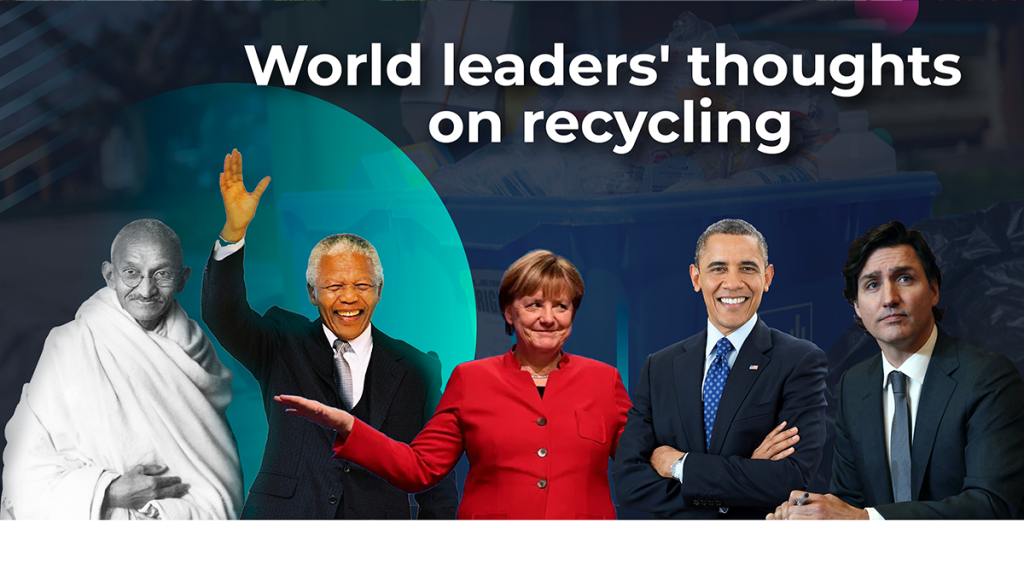
World Leaders’ Policies Towards Environment & Recycling
Leaders and academics from all across the world have lent their support to Global Recycling and clean environment which has become an urgent imperative. Accepting responsibility for what has happened to Earth can save future generations and environment a lot of trouble. Here are five of the well-known environmentalist leaders who contributed to the conservation of natural resources.
NELSON MANDELA ( President of South Africa)
Nelson Mandela, sometimes known as Madiba, was a South African black nationalist and the country’s first black president from 1994 to 1999. Mandela, a Nobel Peace Prize winner, utilised his platform to raise awareness about the growing water crisis in many underdeveloped countries. Mandela stated at the 2002 Earth Summit that access to clean water and sanitation is a basic human right and should be a universal aim on every country’s political agenda. The Peace Parks Foundation was also co-founded by Nelson Mandela. He asserted,
“If we do not do something to prevent it, Africa’s animals, and the places in which they live, will be lost to our world, and her children, forever. Before it is too late, we need your help to lay the foundation that will preserve this precious legacy long after we are gone.”
MAHATMA GANDHI: (Founder of India)
Mohandas Karamchand Gandhi is largely regarded as one of the greatest political and spiritual leaders of the twentieth century. In India, he is revered as the nation’s father.
“The Earth has enough resources for our needs but not for our greed.”
– M.K. Gandhi
Gandhi’s most famous comment expresses his care for the environment and nature. All major conferences, such as the Stockholm Conference in 1972 or the Rio Earth Summit in 1992, were convened after Gandhi’s worries about the environment and its impacts were raised. Gandhi inspired important environmental initiatives in India, including the Chipko movement led by Chandi Prasad Bhatt and Sunder Lal Bahuguna and the Narmada Bachao Andolan led by Baba Amte and Medha Patkar. If Gandhi’s philosophy of nonviolence is implemented at all levels, from international politics to local politics, it can help to reduce the carbon footprints left by wars and missile development.
BARACK OBAMA: (US PRESIDENT)
In his 2015 State of the Union speech, President Barack Obama was one of the world’s most outspoken leaders on the topic of climate change, calling it the greatest threat to future generations. The 2014 agreement with China was crucial in re-energizing international talks leading up to the historic Paris Agreement. His achievements are all the more astounding given that he has faced significant opposition and hindrance along the road, including legal challenges to the EPA’s Clean Power Plan.
His broad-based Climate Action Plan is one of the most distinctive policy successes of his two tenure in the White House.
“Climate change is perversely designed to be hard to solve politically, Political systems are not well designed to do something tough now to solve a problem people are going to feel the impacts of later. If we are going to solve this, we are going to need remarkable innovation.”
ANGELA MERKEL: (GERMAN CHANCELLOR )
Merkel is affectionately referred to as the “climate chancellor” by her country’s media because of her long history of environmental campaigning. She became Germany’s first female chancellor in 2005.
Only a few years later, in 2011, the center-right leader launched a broad new energy policy known as the German energiewende (energy transition), which aimed to shift the country away from nuclear and fossil fuel energy and toward wind, solar, geothermal, and biomass energy. And she wanted it all to happen in a few decades. Merkel’s government set out to shut down all of the country’s 17 nuclear reactors at the time.
JUSTIN TRUDEAU: (CANADIAN PRIME MINISTER)
Trudeau and his Liberal Party ran on a platform of swift action on climate change, and their success in October 2015 made it simpler for Obama to make a key environmental decision: rejecting the Keystone XL oil pipeline.
Obama waited until after Trudeau’s election to reject the pipeline, which would have delivered oil from Alberta’s oil sands to refineries on the US Gulf Coast. But, in addition to assisting other leaders, Trudeau just took a big risk in the cause of climate action by proposing a national carbon pricing. The move, dubbed “a watershed moment for his country,” gives each of Canada’s ten provinces and three territories two years to establish their own carbon pricing strategy, whether it’s a direct tax or a cap-and-trade system.
“Carbon pricing is one of the most efficient ways to reduce greenhouse gas emissions”
Trudeau also has committed $2.65 billion over five years to help developing countries fight the climate crisis.
Conclusion:
Everybody can help the government to save money and energy by reusing materials, as well as lessen the negative environmental effects of extracting and processing virgin resources.
If you like this article you may also like : How to Make Money from Reverse Vending Machines?

